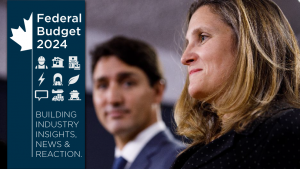Charles Sousa’s message that the province “must build” is encouraging, state construction industry stakeholders, however, the funding to build Ontario up must be spent wisely.
On April 23, the province’s finance minister revealed the 2015 budget, reaffirming the Liberal government’s commitment to spend $130-billion over 10 years on infrastructure.
It begins with a planned investment of $11.9 billion in 2015-16 for infrastructure such as roads, bridges, public transit, water systems, hospitals and schools.
"It’s very satisfying that the government understands the importance of infrastructure to the economy in terms of getting people to work and getting goods to market," states Ian Cunningham, Council of Ontario Construction Associations president.
"The big challenge will be holding the line on spending, particularly given that they are in negotiations with the teachers, and OPSEU, and other public sector unions. We want to make sure it all gets rolled out."
Sousa stated in his speech that Ontario has "not been building fast enough to keep up with our needs," and added gridlock is "choking" the province.
"Transport gridlock accounts for $11 billion in lost productivity in the region every year, so we are pleased to see firm commitments to fund transit infrastructure in order to relieve traffic congestion and get people moving again," explains Patrick Dillon, Provincial Building and Construction Trades Council of Ontario business manager, in a release.
In a budget that’s touting the largest infrastructure investment in Ontario’s history, the province intends to increase funding for the Moving Ontario Forward plan by $2.6 billion for a total of $31.5 billion over 10 years.
"What is most important about this investment is its allocation to the Trillium Trust," says Barry Steinberg, CEO of Consulting Engineers of Ontario in a press statement.
"Separate, dedicated funds for infrastructure investment are the most effective tools for providing value to taxpayers as they provide government a secure means to eliminate Ontario’s core infrastructure deficit."
According to a release, about $16 billion will go towards transit projects in the Greater Toronto and Hamilton Area (GTHA) and about $15 billion will be made available for transportation and other priority infrastructure projects outside the GTHA.
"Going through the budget process, we were hearing that the government was looking at all options including cutting back their commitment to infrastructure," adds David Frame, director of government relations with the Ontario General Contractors Association. "They stuck to their guns."
Sousa also highlighted the province’s move to "broaden the ownership of Hydro One". As recommended by the Premier’s Advisory Council on Government Assets, the government will plan to sell off Hydro One through an initial public offering. Over time it will sell 60 per cent of Hydro One in order to raise $4 billion for infrastructure projects. Ontario will remain the largest shareholder, as the government is proposing by law, that no other shareholder or group be permitted to own more than 10 per cent.
Andy Manahan, executive director of the Residential and Civil Construction Alliance of Ontario, says there weren’t many budget surprises, but how the money is spent is critical.
"We must spend the money wisely," he says. "If we’re not making decisions based on evidence-based approaches…then the public trust could be lost."
The budget document also emphasizes the use of Alternative Financing and Procurement (AFP) as a "cost-effective" model of project delivery, despite previous criticisms by Ontario’s auditor general.
"We can’t continue on with traditional delivery. This means that there’s more onus on governments collectively, not just the province, to do things like streamline the approvals process," adds Manahan.
"It’s really important to get this right."
Karen Renkema, senior manager of public affairs for the Progressive Contractors Association of Canada (PCA), states the funding is welcome but how the projects are tendered needs to be examined.
"We’re very optimistic," she says. "Always the concern for PCA and its members is that the projects are being tendered in an open and fair manner that all contractors can compete on these projects. None of these details are available so that’s something we’ll be watching."
Giovanni Cautillo, executive director of the Ontario Sewer and Watermain Construction Association, says continually investing in infrastructure is "critical for the long-term economic growth of the province."
He also says the fact the government "will look to enhance the reliability of asset management planning by moving towards a common standardization program for evaluating and prioritizing needed investments at the regional and municipal levels" is positive.
"We’ve been advocating for a standardized process for a number of years. It gives you economic, social and environmental benefits for investing in sewer and watermain infrastructure," he says.
The province is projecting a deficit of $8.5 billion in 2015–16, $4.8 billion in 2016–17, and intends to return to balance by 2017–18.
Follow Lindsey Cole on Twitter @DCN_Lindsey.











Recent Comments
comments for this post are closed